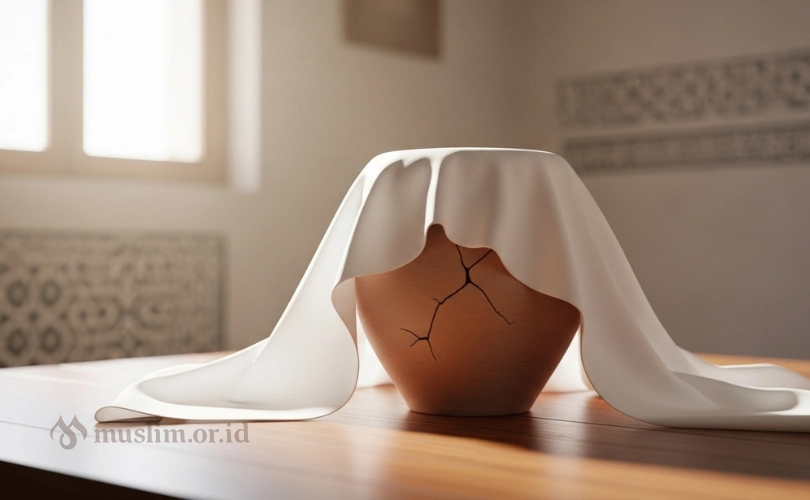Sheikhul Islam Ibnu Taimiyah always gets a test that accompanies him in his life, and the author does not mean the Sheikh test as an insult to him, because he Rahimahullah Life is glorified and respected, even when in prison. Wherever he is, there is always respect and appreciation. What the author means with the exam here is prison and restrictions on his freedom in preaching. [1]
The most difficult thing for a cleric is when he is hindered to convey the Shari’a of God and teach it to humans. A Muslim is indeed tested by Allah Ta’ala with various trials. This is a test of God, with which He tests His servants, and the obligation of a Muslim in dealing with it is to be patient and seek entertainment in His decree. [2]
Outwardly, these things appear to be a test, but actually it is a gift and gift in the form of trials. Ibn Taimiyah was tested with various trials throughout his life because his position had reached its peak, he surpassed all competition, his name was known in every place, and he had a determination as strong as steel, a fluent and sharp tongue, and a strong will to fight. All of that is in the interests of Islam and Muslims. However, his high position has aroused hatred from those who have no these properties and are unable to reach the same degree as him. [3]
Sincerity and sincerity in preaching made themselves superior among the scholars in his day, who were mostly trapped in blind taklid, despicable fanaticism, or lust, for the sake of pursuing unbelievers. That’s how we find Ibn Taimiyah as a reformist and educator, who was involved in battles in various fields, struggled in various places, defending the Qur’an and Sunnah, and refuting all forms of intermediary and anyone who faced it. This caused hostility from his opponents who came from various schools and schools, as well as from the authorities in his time who put him in prison until he died there, Rahimahullah.
However, he left a large inheritance for us, which became the basis for the methodology of monotheism in the field of religion and education of the people, which became an important reference for Muslims afterwards.
And in the end, the test faced by the priest was made by God Ta’ala As a gift for him and for anyone around him. When he went to Egypt in 705 AH, wherever he was, he became a light and clue. When he passed Gaza, he held a big assembly in his mosque and gave a wise teaching. Likewise in 707 AH, he began teaching in Egypt, until God provided great benefits through himself, and people saw him as a sincere person in his heart and mind for God ‘Azza from Jalla. [4]
However, what happens is the existence of people with deep envy in the hearts of sick people, which are caused by their courage in voicing their truth and surrender to him. They also feel disturbed by their orders to ask for good and forbid their crime, and their rejection of him. In fact, some of them reported it to the authorities because they were different from them. Like the excess of Sufism, heresy, fools, and those who have departments and are afraid of losing their position, and those who have sold their religion for the world.
Likewise, Ibn Taimiyah’s life is full of successive series of tests that come to him. It was jailed seven times [5]: Four times in Egypt (in Cairo and Alexandria) and three times in Damascus. The beginning he was imprisoned was when he was twenty -two years old, after returning from the pilgrimage, where he began to face trials in the form of detention, torture, and strict supervision for 34 years, starting from 693 AH until his death at Qal’ah Prison in Damascus on Monday, 20 Zulkaidah 728 H.
There are various reasons behind their detention:
1) The first detention occurred in Damascus in 693 H for a short time.
2) The second detention occurs in Egypt because of differences of opinion regarding the attributes of God, such as problems ‘Arsy And Downside Allah, and lasted for one year and six months from Ramadan 705 H to Shawwal, Rabi’ul early 707 H.
3) The third detention in Egypt occurs because he forbids Tawassul And Istighatah To creatures, as well as his statement about Ibn Arabi the Sufi, and the duration was also short, starting from the beginning of Syawal 707 H to 18 Shawwal 707 H.
4) The fourth detention in Egypt is a continuation of the third detention, lasting more than two months from the end of Shawwal 707 H until the beginning of 708 H.
5) Fifth detention occurs in Egypt, a continuation of the fourth detention, where he was transferred to Alexandria and was strictly guarded for more than seven months, from the beginning of Rabi’ul early 709 H to Shawwal 709 H, on the incitement of several parties who had interests.
6) The sixth detention occurs in Damascus because of his statement regarding the oath with divorce, which he considers as an oath that must be redeemed. This detention lasted five months twenty -eight days, from 12 Rajab 720 H to 10 Muharam 721 H.
7) The seventh and last detention occurred in Damascus due to differences of opinion regarding the grave pilgrimage considered sunnah and heresy, which lasted for two years, three months, and fourteen days, starting on Monday, 6 Sya’ban 726 H until the night of his death on Monday, 20 Zulkaidah 728 H. [6]
However, Allah Ta’ala Make everything good from Ibn Taimiyah and his people. With God’s permission, through this prison, many people receive guidance. His knowledge spread from Egypt to North Africa and Andalusia. As mentioned in God’s Word ‘Azza from Jalla,
So, it is possible to hate something and make God in it a lot.
“Maybe you hate something, when God has made him very good.” [7]
And the word of God,
And God knows that you don’t know
“God knows, while you don’t know.” [8]
[Selesai]
Back to section 1
***
Writer: Gazzeta Raka Putra Setyawan
Article Muslim.or.id
Footnote:
[1] Ibn Taimiyah by Sheikh Muhammad Abu Zuhroh, p. 49.
[2] Al-Waabilu Ash-Sajayyib, The work of Ibnul Qayyim, p. 7.
[3] On. Cit, matter. 49; with change.
[4] Ibid, matter. 55, 60-62; with change.
[5] Al-Madaakhil Ila Aatsari Syaikhul Islam Ibnu Taimiyah, Karya Sheikh Dr. Bakr bin Abdillah Abu Zaid, p. 31-37; with changes and summarized by the author.
[6] Ibid, matter. 32-37; with changes and summarized by the author.
[7] QS. An-Nisa ‘: 19.
[8] QS. Al-Baqarah: 216.
Game Center
Game News
Review Film
Rumus Matematika
Anime Batch
Berita Terkini
Berita Terkini
Berita Terkini
Berita Terkini
review anime



